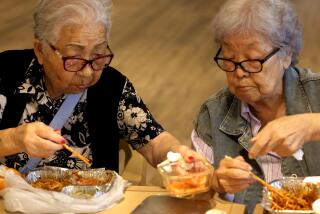Hometown Hero : Panhandling and crime have taken a toll on the businesses and residents of Little Tokyo.But Brian Kito and his patrols are out to make the streets safe.
The clatter of cans gets Brian Kito’s internal radar hopping. He motions for his five-man foot patrol to fol low him into the shadows of a parking lot in Little Tokyo.
“Who’s there?” Kito asks, swinging open the door of a shed.
Flashlights zoom in on a forager named Tommy, who swears at the crime-fighters. “This is how I make my living!” he says angrily.
“Well, not tonight,” Kito says kindly. “Please leave. C’mon, move on.” Kito motions with a flashlight and then follows the man--cart in tow, still swearing--out of the area, past swank sushi bars and elegant restaurants on one side, Mercedeses and Jaguars parked on the other.
For the past two years, Kito, the leader of Little Tokyo’s Public Safety Patrol--a citizens group that has helped discourage panhandling, vagrancy and burglaries--has worked to make the area safer for merchants, tourists, visitors and its mostly elderly residents.
His work has caught the attention of merchants on historic Olvera Street, along Broadway and Main Street, and on the Westside interested in starting similar watch groups. This past weekend, Chinatown merchants assisted by Kito and his volunteers began their first patrol.
Now the rest of the nation is starting to notice Kito too.
The Timberland Co. recently featured Kito, 38, in its “model person” advertising campaign--two pages of play in Details, GQ, Esquire and Rolling Stone.
“When volunteer Brian Kito patrols the L.A. streets, the elderly residents of Little Tokyo walk safely in his strong shadow,” the ad says.
Elise Klysa, a Timberland official, says Kito was one of six people included in advertising by the footwear and outdoor apparel manufacturer, citing their volunteerism.
For his time, the company paid Kito $1,000. He donated half to the Greater Little Tokyo Anti-Crime Assn., which was formed by merchants in 1982 and sponsors the safety patrol. He gave the other half to Little Tokyo’s Neisei Week Festival.
“Brian is helping transform a community,” Klysa says. “He’s proof that human nature is a powerful force.”
“He’s the gentle giant of Little Tokyo,” says friend Jack Nakashima, 72, who was mugged years ago and today is one of 50 patrol volunteers.
Kenji Suzuki, co-owner of Suehiro Cafe, agrees. “Brian is trying his best to clean up the image for his Little Tokyo town,” says Suzuki, who carries a radio, cellular phone and flashlight when he volunteers with the squad twice a month. “Brian’s just a real good guy. He cares because he grew up here.”
Kito is embarrassed by the attention. He’s no hero, he says. He’s just a bachelor and a baker with a business degree who, eight years ago, took over his family’s confectionery, Fugetsu-Do, after his parents retired and his three older siblings chose other work. The shop is the country’s oldest family-owned Japanese business, Kito says. It is listed in the National Register of Historic Places.
His commitment to his Downtown community comes from being “a little more culturally aware and responsible to Little Tokyo than most of my generation,” Kito says. “A lot of the responsibility has fallen on my shoulders only because I am here, because my family has been here since 1903, because I grew up here.”
And because “we just let this (crime) problem go on a little too long,” Kito says during a break on the night patrol. “The Japanese American community is a small community and word-of-mouth spreads like wildfire. When a car gets broken into while someone is shopping or eating in a restaurant, that’s bad for Little Tokyo.”
Kito says that when the patrol started in 1992--under the anti-crime association’s more youthful leadership--he and other volunteers would encounter as many as 20 to 30 aggressive panhandlers in a night, sometimes in groups of three or four that would swarm individual customers. Some would rummage through the trash, others would shadow visitors for two to three blocks, begging relentlessly.
“Guys would say they’d wash your windows and watch your car while you went into a restaurant. They’d take anywhere from 50 cents to $20 from tourists, and then they’d really break into the car,” he says. “These guys are opportunists. They’re drug addicts, not looking for help. They don’t want food.”
Until recently, he says Little Tokyo’s elderly “felt like prisoners in their own apartments, afraid to come out and get their purses snatched and be easy targets.”
And visitors to Little Tokyo would be frightened away by beggars, he says. “I have lots of sympathy for the homeless,” he says, “but panhandling has taken its toll” on the 400 businesses contained in Little Tokyo’s 12 city blocks.
*
At first, Kito says, he thought homeless advocates would come down hard on him and the group. But that hasn’t been the case.
In anti-crime association posters, tourists and residents are discouraged from giving to panhandlers. Instead, they are encouraged to donate to the Chrysalis Institute, which helps the homeless in Skid Row, and the Little Tokyo Service Center’s emergency caregiver program, which also provides shelter referrals and food.
Alice Ishigame, the center’s project coordinator, says she knows that the group isn’t a vigilante force, that its members neither carry weapons nor make arrests. Kito and his volunteers are polite to panhandlers, she says, “but it would be great if they could provide meal coupons or shelter vouchers to the homeless on their encounters.”
Kito says the group researched a coupon campaign, but rejected the idea after speaking to homeless advocates in Santa Monica and elsewhere, who said panhandlers often collected and sold the coupons.
Instead, Kito and his group give the homeless a Skid Row emergency-services list that includes 15 locations that offer free meals during the day as well as shelter, free medical care and employment counseling.
Kito also has the support of the Los Angeles Police Department’s Central Division. Every night, before a patrol begins its shift, the squad checks in with the division’s watch commander.
“If they see that something doesn’t look right, they contact us right away,” says Daryl Vest, the division’s senior lead officer who helped organize the group and provided volunteers with training.
Vest, who occasionally accompanies the group on the night beat and meets with members of the anti-crime association, says that “the group and police department working together” has helped reduce crime in Little Tokyo by 66% over a year ago.
Every six months, Kito speaks at an orientation for new officers in the area. “I tell them what we’re all about and how we’re there to help the community and be the eyes and ears for the police,” he says. “The important thing is this: We can bark all we want, but LAPD is our bite.”
*
In the late 1970s and early ‘80s, Kito led a fight against a Community Redevelopment Agency plan that would have relocated many of Little Tokyo’s small businesses.
But instead of relocations, “I saw small mom-and-pop shops being closed down, pushed out, because they didn’t have the English skills to be able to negotiate. They got rooked,” he recalls. His family lost their second business, a bakery, which was forced out to make room for an office tower.
“I fought for meetings to be held in both Japanese and English. That was the only way I could get people to come to the meetings,” he says.
But the Kitos and Fugetsu-Do have endured Little Tokyo’s transformation, which has doubled the number of housing units, tripled the hotel capacity, and brought sleek office towers and exclusive boutiques to the area once dominated by family sushi shops and cafes.
Now, disgusted with broken glass from smashed car windows in the streets, Kito wages a war against crime. As the Timberland ad proclaims, he is “a human tornado” wiping out violence.
“I’m entrenched in Little Tokyo,” says Kito, a Sansei , or third-generation Japanese American, who was born in Boyle Heights and now lives two blocks from his business.
“This is my home. I remember what this place used to be like when I was a kid. I used to play on the street and run around on my own, play hide-and-seek in the different stores and restaurants. Back then everybody knew who you were.
“As a kid, I’d go into stores and get some fruit, get my shoes repaired. You could walk anywhere in Little Tokyo and feel safe. And now I really feel bad when I see new merchants in the area with kids and the parents are so worried for them. Two years ago you wouldn’t let your kids on the street by themselves. You’d fear for their safety.”
*
These days, thanks to the patrol, merchants are a little more at ease, says Paul Kurdian, owner of Bella Pelle, a leather-goods shop. “For some people, there is a fear factor with coming Downtown, but Little Tokyo--because of Brian--is changing its image.”
Proprietors, visitors and the police agree. They cite the near disappearance of panhandlers; the absence of cardboard beds on side streets, tents in alleys and the stench of urine. And less smashed glass is found on the streets.
Safety seminars have been conducted for residents, the patrol is expanding and the construction of a koban , or Japanese-styled police substation, is in the works.
“The bad guys are beginning to learn what they’re up against,” Kito says as he strolls past a strip of restaurants that once had customers lined up outside. He yearns for the day when those businesses and others are again brimming with visitors.
“After I graduated from college in 1980, I told my dad that I would stay in the business for two years. ‘I’ll give you two years and then we can make the transition,’ ” he remembers telling his father, now 74.
At the end of the second year, he assumed legal ownership of Fugetsu-Do and promised to fulfill his father’s wish: to keep the business in the family for its 100th birthday.
“It’s hard to say no. I rarely say no, especially if it’s somehow related to Little Tokyo, to getting Little Tokyo back to the way I remember it. And that means helping,” he says.
“The Japanese have this saying: ‘When you do for others, the gods will repay you.’ But the merchants here were always doing for me when I was a kid, when I was going through college--and now I’m just giving back because, really, we are all in this together.”
More to Read
Sign up for Essential California
The most important California stories and recommendations in your inbox every morning.
You may occasionally receive promotional content from the Los Angeles Times.










